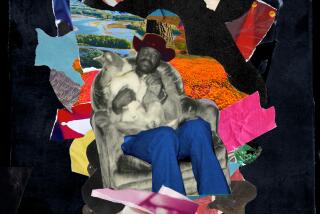POP MUSIC REVIEW : Aaron Tippin Keeps One Foot in the Old Country
- Share via
SAN JUAN CAPISTRANO — “I learned to love country music by listening to that ollld country music,” Aaron Tippin explained to a small but enthusiastic crowd at the Coach House on Monday night as he launched into a raucous version of Johnny Cash’s 1956 classic “Folsom Prison Blues.”
Tippin made it clear throughout his 80-minute set, however, that when he said he was inspired by the old country music he wasn’t referring to some ancient cowboy stoically singing to his cattle while he wiped a tear out from his eye with his pony’s mane.
Tippin drew on the naked emotionalism and unabashed hillbilly twang of such seminal honky-tonk heroes as Hank Williams and Buck Owens, but he whipped out his music with a supercharged 1990s drive. It was as though the chugging freight train in the Cash song had suddenly become a bullet train.
Tippin’s six-piece band combined the traditional hillbilly instruments of fiddle and steel guitar with a double bank of electronic keyboards, loud electric guitar and a formidable drum kit that would not have been out of place in a heavy-metal band. Thus, although the steel and the fiddle took the lead on most of the numbers, their high-pitched whine was filled out with the driving rhythm of the other instruments. The result was country music that was twangy, rocking and, above all else, loud. Tippin not only wants everybody in the house to know that he loves that old country music, he wants the whole neighborhood to know it, too.
But, then, there was nothing shy or tentative about Tippin’s approach Monday. His choice of material reflected his in-your-face attitude. He started his 17-song set with his recent hit, “I Wouldn’t Have It Any Other Way,” a declaration of individualism, and closed with his other signature songs, “You’ve Got to Stand for Something” and “There Ain’t Nothing Wrong With the Radio.”
You can bet that if somebody were to tell Tippin they don’t like country music, he’d probably just crank up his amps several more notches. Even when he sang a classic cheating song, Tippin didn’t pick any of the numerous shame-soaked anthems in the country vaults. Instead he selected “Hell Yes I Cheated.” When he delivered his own soulful current hit “I Was Born With a Broken Heart,” Tippin hammered it out as though the lyrics signified a badge of pride, not a mournful lament.
Tippin was a whirlwind of energy throughout the concert. He hardly paused for air all evening. He punctuated his songs by raising his fist, kicking his legs up and, in many cases, by illustrating the lyrics with gestures. When another musician took a solo, Tippin was right beside him coaxing him on to greater heroics.
When he wasn’t belting out songs from his two RCA albums, “You’ve Got to Stand for Something” and “Read Between the Lines” or such well-chosen covers as “Hell Yes I Cheated” and Buck Owens’ “I’ve Got a Tiger by the Tail,” Tippin exhorted the audience to engage in a honky-tonk custom from his home state of South Carolina. “Come on, everybody--one, two, three--driiinnnk!” Then, while folks were emptying their glasses, Tippin would spin a story that would eventually lead into his next song.
Thus, even though Tippin sang those old country blues about broken hearts and lost love, he delivered a feel-good show that produced the adrenalin rush of a rock concert. In fact, if Tippin had any shortcoming as a performer, it would be that in his efforts to be constantly upbeat, he downplayed his quieter, more soulful side. Even his chilling lonesome yodel on “She Made a Memory Out of Me” was all but overwhelmed by the relentless pounding of the kick drum and the loud keyboards and guitars.
It wasn’t until the very end, when Tippin encored with a trio of songs by Hank Williams, that he unleashed his potential to bring out the sadder side of country. When Tippin reached way down into the bottom of his country soul to deliver a version of “I’m So Lonesome I Could Cry” that sent a shiver through the audience, you knew that, Hank Williams’ honky-tonk blues had, indeed, been passed to the right hands.
More to Read
The biggest entertainment stories
Get our big stories about Hollywood, film, television, music, arts, culture and more right in your inbox as soon as they publish.
You may occasionally receive promotional content from the Los Angeles Times.








